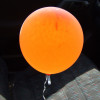Planet 9
Interview with
Since the demotion of Pluto from a planet to a dwarf planet in 2006, our solar system has had a vacancy for a 9th planet. We have reason to believe that a ninth planet exists, but no one has ever seen it...perhaps until now. Astrophysicist Michael Rowan-Robinson from Imperial College London has been looking through decades-old data that had previously been thrown into the proverbial trash pile, and has discovered a mysterious object that he reckons could be a new planet...
Michael - I set out to find the postulated 9th planet, which has been proposed to explain the motion of dwarf planets in the outer solar system.
Sally - The search for the 9th planet. It sounds just like the plot of a sci-fi novel, but it's something astrophysicists are very seriously looking for. I'm sure you were all as deeply as upset as I was when Pluto was demoted from planet to dwarf planet status in 2006, but that was because physicists realised that there were thousands of these Pluto like objects or 'planetesimals' flying around in this part of the solar system. Meg Schwamb from Queen University Belfast studies these objects and explains that something in their behaviour just isn't quite right.
梅格,有一组星子have been recently discovered that seemed to be all aligned and being found in one part of the sky. For that to happen there needs to be a big mass still around in the solar system. I like to think of it like sheep. The sheep dog is keeping everybody in line. That's led people to really think about this planet 9 theory that's proposed. Can we find that sheepdog? Should we look?
Sally - This question of, 'is there a 9th planet that we don't know of yet' has been puzzling astrophysicists for a long time. For Michael it's perplexed him for decades?
Michael - I have been interested in the idea of a planet in the solar system since 1983. In 1983 I was working on the IRS space mission.
Sally - This IRAS satellite looked for objects in the infrared range, looking for the tiny amount of heat given off by distant objects. At the time everyone thought planet 9 would be a large planet at the furthest reaches of the solar system, corralling all of those little planetesimal sheep. But after failing to find any good candidates in the data, Michael wondered what if planet nine isn't far away? What if it's just small with these new criteria in mind Michael looked through all of the satellite observations that had previously been discarded.
Michael - So I was left with about a hundred odd cases. I eliminated most of them and I was just left with this one case, which I just still can't rule out. That is my candidate.
Sally - Does that mean it's a planet?
迈克尔-这是一个有趣的问题。It's about the right sort of distance. It's about the right sort of mass. It's extremely close to the plane of the Milky Way, which makes it very difficult to observe and it makes the detections that I have doubtful because it could be that they are just a cell of dust. But it's there. It's the best that I could find in this vast search.
Sally - If you're a gambling man, how likely would you say this is another planet?
Michael - It varies from moment to moment and day to day. When I drafted the paper I said, 'I suppose the reality is perhaps 50%' but some days I wake up and think it's 1%. I just can't say.
Sally - And what do other scientists think? Could this mystery object be the 9th planet physicists have been looking for for so long? Meg Schwamb.
Meg - I don't think there's enough evidence to say it is. I think it's interesting. If it's real, we will hopefully be able to detect it with a proven observatory and see it moving in optical wavelengths. I'm excited either way. It helps us understand more about our solar systems. It's okay if it turns out not to be real. It could be super exciting if it was but I think either way we reveal something new about our solar system.




Comments
Add a comment